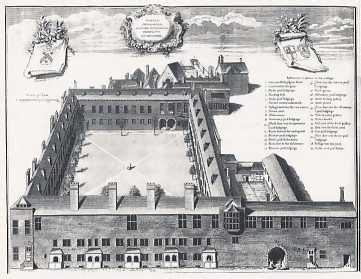- 1660 – At Gresham College, twelve men, including Christopher Wren, Robert Boyle, John Wilkins, and Sir Robert Moray decide to found what is later known as the Royal Society.
Gresham College.
Barnard's Inn Hall, the current home of Gresham College
Gresham College is an institution of higher learning located at Barnard's Inn Hall off Holborn in central London, England. It was founded in 1597 under the will of Sir Thomas Gresham and today it hosts over 140 free public lectures every year within the City of London.
Sir Thomas Gresham, founder of the Royal Exchange, left his estate jointly to the City of London Corporation and to the Mercers' Company, which today support the college through the Joint Grand Gresham Committee under the presidency of the Lord Mayor of London. Gresham's will provided for the setting up of the College – in Gresham's mansion inBishopsgate, on the site now occupied by Tower 42, the former NatWest Tower – and endowed it with the rental income from shops sited around the Royal Exchange, which Gresham had established.The early success of the College led to the incorporation of the Royal Society in 1663,which pursued its activities at the College in Bishopsgate before moving to its own premises in Crane Court in 1710. The College remained in Gresham's mansion in Bishopsgate until 1768, and moved about London thereafter until the construction in 1842 of its own buildings in Gresham Street EC2. Gresham
College did not become part of the University of Londonon the founding of the University in the 19th century, although a close association between the College and the University persisted for many years. Since 1991, the College has operated at Barnard’s Inn Hall, Holborn EC1.Professors.
The seven original Gresham College Professorships that date back to the origins of the college are as follows:These original endowed chairs reflect the curriculum of the medieval university (the triviumand quadrivium); but as a place for the public and frequent voicing of new ideas, the college played an important role in the Enlightenment and in the formation of the Royal Society. Early famous Gresham College professors have included Christopher Wren, who lectured on astronomy in the 17th century, and Robert Hooke, who was Professor of Geometry from 1665 until 1704.
The professors received £50 a year, and the terms of their position were very precise, for example:- The geometrician is to read as followeth, every Trinity term arithmetique, in Michaelmas and Hilary terms theoretical geometry, in Easter term practical geometry. The astronomy reader is to read in his solemn lectures, first the principles of the sphere, and the theory of the planets, and the use of the astrolabe and the staff, and other common instruments for the capacity of mariners.
Today, the professors hold their positions for three years, and give six lectures a year. There are regular visiting professors appointed to give series of lectures at the college and an eighth full chair, of Commerce, joined the original seven in 1985.Gresham College today
Since 2000, the college regularly welcomes visiting speakers who deliver lectures on topics outside its usual range, and it also hosts occasional seminars and conferences. Today the college provides over 140 lectures a year, all of which are free and open to the public.Although many of the lectures are held in Barnard’s Inn Hall, the majority are now held in the lecture hall at the Museum of London, for reasons of capacity.Since 2001, the college has been recording its lectures and releasing them online in what is now an archive of over 1,000 lectures. Annual lectures of particular note hosted by the college include: the Gresham Special Lecture, the Sir Thomas Gresham Docklands Lecture, the Annual Lord Mayor’s Lecture, the Gray’s Inn Reading and the Boyle Lecture.
The Latest from David C Wallace, author /historian. Writer of the British Chronology Series.
Thursday, 27 November 2014
The Royal Society
Subscribe to:
Post Comments (Atom)


No comments:
Post a Comment